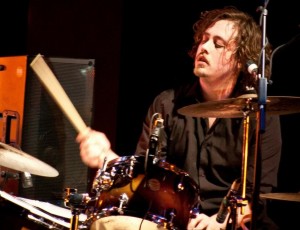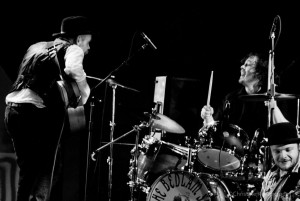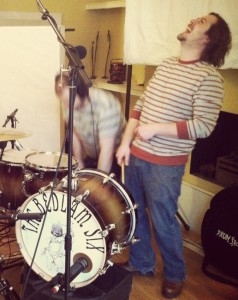Bedlam Six drummer Tom Cleghorn tells Louis how he goes from being a wild man behind his kit during gigs to the more considered thrill of the recording studio, and relives the tale of the elusive seagulls.
 A regular audience observation after our gigs is just how physical you are behind the drum kit. You REALLY hit those things hard. Sometimes I look around and see the snare drum covered in blood and you have a possessed look on your face. Do you find recreating that energy and intensity in a recording setting difficult? How do the performances differ between the stage and the studio?
A regular audience observation after our gigs is just how physical you are behind the drum kit. You REALLY hit those things hard. Sometimes I look around and see the snare drum covered in blood and you have a possessed look on your face. Do you find recreating that energy and intensity in a recording setting difficult? How do the performances differ between the stage and the studio?
The funny thing is that when I started to learn the drums, my teachers would always tell me to hit the drums harder. I wasn’t particularly confident and it wasn’t really until The Bedlam Six got into full swing that more energy and confidence found its way into my drumming. Since then I’ve been likened to Animal from The Muppets. As you rightly said, there have been times when I’ve shed blood for the greater good – but, in all honesty, in the thrill of the moment you don’t really feel it. In the studio that thrill isn’t so all-consuming. Without the crowd you have to somewhat create that sensation for yourself, remembering that the energy we have on stage is an essential part of the music. I think about what I would want to hear from the drums on an album and try to put as much as I can into each take. Studio performance is more controlled – for me it’s about taking the energy that makes me more animated on stage and putting it into solid beats.
Having worked together for a long time now, I’ve noticed that when we’re going through a new song you don’t simply bash out an indiscriminate rhythm behind the tune. You carefully consider which pieces of your kit will work best and how to accent different sections, shifting certain emphases and building a story – kind of like the changing weather behind a conversation in a film. Do you think this is something too many drummers neglect? Or is there a danger of overthinking your rhythm parts and missing the basic groove? Is it all about finding a balance?
There’s always a danger of overcomplicating a part when you work with a group like this, because different instruments tend to create counter melodies at different points. I like to listen to those counter melodies and try to find a way to complement them. My first thoughts when listening to new songs are “Where is the pulse?” and “Where will the emphasis be in regards to that?” I often spend the first run-through of a new song with a very simple rhythm in my mind, building up more layers as the song is played. It’s always important to remember that each piece of the kit is incredibly versatile; you need to use your ears to find what sound will work where, striking a balance between the fundamental groove and the mood you wish to create.
In the past we’ve really struggled to capture the energy of our live shows when recreating the songs in a studio environment. Did you find our decision to record the bulk of the tunes live in the same room a blessing or an unnecessary pressure? After all, if the drums aren’t up to scratch in those early sessions then it’s back to square one…
Personally I much prefer the live room setting: it’s easy to gauge if the feeling is right. When working solely to a click it’s all too easy to play the beat but not have the groove. When you look around and see everyone on the same page then you know the take is going well.
 I remember one day during the recording when you spent something like eleven uninterrupted hours behind the kit perfecting a single drum part. That kind of dedication is pretty admirable, but can it lead to a diminishing of spontaneity? Or does it depend on the song?
I remember one day during the recording when you spent something like eleven uninterrupted hours behind the kit perfecting a single drum part. That kind of dedication is pretty admirable, but can it lead to a diminishing of spontaneity? Or does it depend on the song?
It depends on the song. That was a really tough day. It was a song that had been around a while, but hadn’t been played live very often. I already knew what the beat would be and everyone agreed it was the right one, but on that particular occasion my brain unfortunately decided that it would take a stroll and leave me as coordinated as a three-legged giraffe in a landslide. Frustration doesn’t exactly help with a situation like that, but in the end it did help with the energy. The final take was a rage-fuelled battering session that saw me grinning from ear to ear once it was over.
We’ve been doing this for a long time now. We could almost perform some of these songs in our sleep. The rest of us have the advantage of seeing the audience reactions (and even jumping into the crowd), but how do you keep up the enthusiasm while stuck in the back row? Does it frustrate you being so utterly essential and yet sometimes completely invisible?
Not at all. Everyone is so animated on stage and we’re always looking to one another, so enthusiasm is never hard to find. The bits of the crowd I can see through gaps in my kit are enough to tell me how it’s going. The only thing is that after a show people sometimes look at me as if I’m some sort of crazy, sweaty hanger-on. Maybe that’s just how I look after a gig – who knows?
Do you have any kind of regime to keep yourself fit for drum work? Some people – unkind people – joke about drummers getting to sit down for the whole show, but there’s a lot more to it than that, isn’t there?
Ha, if only that was all people mocked drummers for! Every drummer knows that there’s no shortage of jokes at our expense, but they also know that there’s a lot more to what we do. The constant use of your arms and legs is quite the workout, but not so much for the beer belly. Prior to this year my workout regime consisted mainly of a few stretches before a show and a bit of leg drumming, but time is trickling away and my somewhat sedentary lifestyle needed a lift. I now have a daily exercise regime for the old gut and also attend gymnastics classes.
You and I had the bulk of our tasks at the start of the recording process and then long days of nothing while the others recorded solos and so on. Personally, I went a bit stir-crazy. How did you tackle the boredom? Any tips for other musicians locked away in the studio?
It’s hard when you have to sit around all day. Books help, but sometimes it’s very difficult to read when there’s a cacophony of sound happening all around you. There can also be a tendency to drink too much coffee, which isn’t conducive to sitting quietly. Fortunately the kind of stir-crazy that we drifted into had a tendency for hilarity and ith people popping in and out to record extra parts there was always something to listen to, food to be cooked and the occasional wound to be tended.
 Trying to record those damn seagulls was a pain, wasn’t it? Jeez…
Trying to record those damn seagulls was a pain, wasn’t it? Jeez…
What an hilarious day! It all started so well, too. “Where will we find seagulls?” we asked. “The beach, of course!” How wrong we were. Though we did get lots of lovely sounds of the waves and shingle, there was neither sight nor sound of seagulls. We gave up on the beach and went to a nearby park, and while you went running round the small lake trying to coax seagulls my way, I stood stoically with the recorder and waited…to no avail. So on we trudged, not quite as hopeful as before, and then we suddenly heard the bright, clear call of a seagull. Looking wildly around, we spotted the blasted creature atop a lamppost in the middle of a mini roundabout! Unfortunately, all the cars surrounding us meant that there was no way of getting a good sound. We set off for home with somewhat heavy hearts, but not before one last seagull chasing episode – we were so close to capturing the holy grail of our quest when a confounded digger drove past and decimated all other sounds for metres around. As with all such quests, the jewel ended up being found far closer to home – in the back garden of the studio. Ah, life…
Any other thoughts on our recording process this time? Things you’d change or improve, or particular memories from the eighteen days we all spent locked away together?
It’s always a pleasure to be recording. Hearing all the different parts coming together is like the focus shifting on a magic eye picture. I don’t think I’d change a thing – well, maybe the eleven hours recording one track, but only for my own hubris. It’s the people that make the experience; if you were locked away for three weeks with people you didn’t like then it could quickly turn into a bloodbath. For me, the particularly good times included recording the backing vocals, which is always comedic, and creating the tolling bells sound for The Debtor’s Wife – so much fun!
